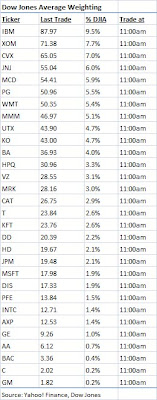There is a lot of chatter on the Internet about the US Government possibly taking over Citibank and/or Bank of America as early as this Friday evening. While we’re not here to speculate on the exact timing, the probability of a bank nationalization in the US within the coming months is very, very high. The rule of thumb I followed with the Bush 43 Administration was, whatever they say, it is three times worse. With President Obama (through no fault of his own) it is, whatever that say, it will come three times faster. So the rumored Fall 2009 nationalization may come three seasons earlier. . .
Effect on the DJIA
Both Citigroup and Bank of America are components of the Dow Jones Industrial Average (DJIA). The Dow is a price-weighted index comprised of 30 major corporate stocks (the term “industrial” is a bit of an anachronism). Based on the methodology Dow Jones & Company, Inc. uses to calculate the average, removing the two stocks would have little impact.
(More with a full Dow weighting table, Citibank, Bank of America and others after the jump . . . )
The table below shows the weightings of the Dow 30 stocks in the index as of February 20, 2009 at 11:00am EST:
The market’s “problem child” companies, General Motors, Citigroup and Bank of America, are the least weighted stocks in the Dow. Were any or all of the three to go to zero, they would have a minimal immediate impact on the index. Behold the predictive power of Charles Dow, the pain in the market from these companies has already been inflicted!
There is, of course, a flip side to potential impact that a GM bankruptcy or bank nationalization would have. The feedback in to the general economy would, of course, effect other companies (such as Exxon selling less gas or JP Morgan coming under pressure) and that would have a larger impact on the Dow. So, for now, Dow’s methodology may vindicate buy the rumor, sell the news, but if the news tomorrow is even worse . . .
. . . And that’s how it goes



